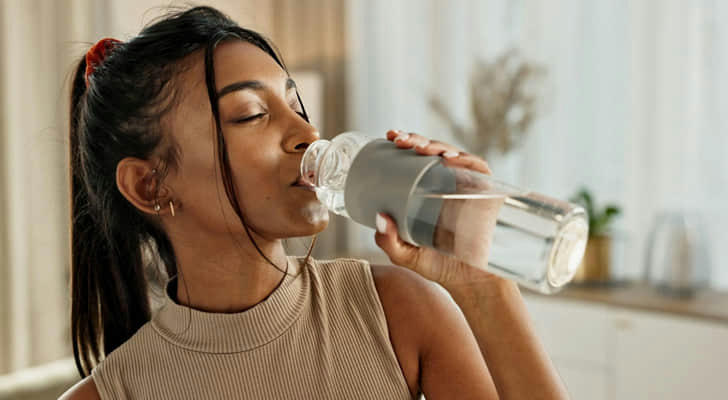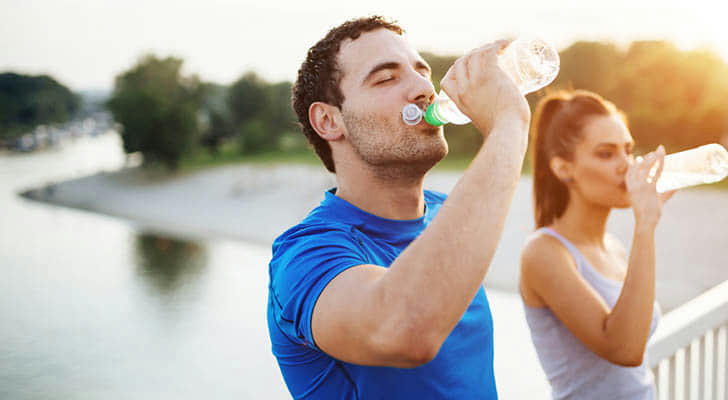Are You Drinking Enough Water? Signs of Dehydration 🚰💧

We all know that water is essential for life, but how many of us are actually drinking enough? Dehydration can sneak up on you, often without you even realizing it. In this article, we’ll explore the importance of staying hydrated, signs of dehydration to look out for, and how to ensure you’re getting the right amount of water for optimal health.
1. Why Water is Crucial for Your Health 💦
The Role of Water in the Body
Water is the most important nutrient for the body. It makes up about 60% of your total body weight and is essential for almost every bodily function. From regulating body temperature to transporting nutrients and removing waste, water is at the core of your well-being.
Key Functions of Water:
- Hydration: Keeps every cell in your body functioning properly.
- Temperature Regulation: Helps control your body’s internal temperature.
- Nutrient Transport: Water is the vehicle for delivering oxygen and nutrients to cells.
- Waste Removal: It aids in flushing out toxins and waste products through urine and sweat.
How Much Water Do You Need?
The “8 glasses a day” rule is often cited, but hydration needs vary based on factors like age, weight, activity level, and climate. On average, men need about 3.7 liters (125 ounces) of total water a day, and women need around 2.7 liters (91 ounces).
However, individual needs can be different, and the best way to determine if you’re drinking enough is to listen to your body.
2. Signs of Dehydration: How to Tell if You’re Not Drinking Enough 💧⚠️
1. Dry Mouth and Thirst
One of the most obvious signs of dehydration is feeling thirsty. When your body is low on water, it sends a signal to your brain, making you feel thirsty. You might also notice your mouth feeling dry or sticky.
2. Dark Yellow Urine
Your urine is a great indicator of hydration. If you’re drinking enough water, your urine should be light yellow or clear. If it’s dark yellow or amber, it could be a sign that you’re dehydrated and your body is holding on to whatever water it can.
3. Fatigue and Dizziness
When you’re dehydrated, your blood volume decreases, which can lead to fatigue, lightheadedness, or dizziness. If you’ve ever felt sluggish or weak after a workout, dehydration might be the cause.
4. Dry Skin and Lips
Your skin is your largest organ, and it’s highly sensitive to dehydration. If you’re not drinking enough water, you may notice dry, flaky skin or chapped lips. Lack of moisture can make your skin feel tight and dull.

5. Headaches
Dehydration can lead to headaches or migraines. When your body is dehydrated, it can cause the brain to temporarily shrink, which triggers pain receptors. These dehydration headaches can sometimes feel similar to tension or migraine headaches.
3. Dehydration and Physical Performance: The Impact on Exercise 🏋️♀️💦
How Dehydration Affects Workouts
Hydration is key to maintaining peak physical performance. When you’re dehydrated, your muscles don’t get the nutrients and oxygen they need, and your body struggles to regulate temperature during exercise. This can lead to fatigue, muscle cramps, and even heat exhaustion.
Symptoms of Dehydration During Exercise:
- Muscle Cramps: Lack of water leads to an electrolyte imbalance, causing painful cramps.
- Reduced Endurance: You may notice a decrease in performance as your body struggles to cope with dehydration.
- Increased Heart Rate: Your heart has to work harder to pump blood and oxygen to muscles when you’re dehydrated.
Staying Hydrated During Exercise:
Drink small sips of water throughout your workout rather than chugging a large amount all at once. This ensures your body absorbs it properly and prevents a water slosh in your stomach.
4. The Hidden Signs of Dehydration You May Not Know About 🧠
1. Poor Concentration and Brain Fog
Water isn’t just essential for your body—it’s also crucial for brain function. When you’re dehydrated, you might experience difficulty focusing, memory problems, or an overall sense of mental fatigue. Dehydration slows down your cognitive processes and reduces your brain’s ability to perform at its best.
2. Constipation
Water is essential for keeping things moving in your digestive system. If you’re not drinking enough water, your body may absorb more water from your stool, making it harder to pass. This can lead to constipation and discomfort.
3. Bad Breath
When you’re dehydrated, your body produces less saliva. This can lead to a dry mouth, which encourages the growth of bacteria that cause bad breath. Drinking enough water can help maintain good oral health and prevent this issue.
4. Increased Hunger
Sometimes, when your body is dehydrated, it sends out hunger signals, even though you’re not actually hungry. This happens because the brain sometimes confuses thirst with hunger. If you’re feeling extra hungry, try drinking a glass of water first to see if it satisfies your cravings.
5. Tips for Staying Hydrated Throughout the Day 💧

1. Carry a Water Bottle
Having a water bottle with you at all times makes it easier to stay hydrated. Whether you’re at work, at the gym, or on the go, having a bottle handy will remind you to drink more water.
2. Set Hydration Goals
Set a specific goal for how much water you want to drink each day. Use your phone’s reminders or a hydration app to track your intake and help you stay on top of your water consumption.
3. Eat Hydrating Foods
You can get water from foods, too! Many fruits and vegetables are packed with water. Try eating hydrating foods like watermelon, cucumbers, oranges, strawberries, and celery to boost your hydration levels.
4. Drink Herbal Teas or Infused Water
If plain water feels boring, try infusing it with fruits, herbs, or a splash of lemon for a refreshing twist. Herbal teas are also a great way to hydrate and can offer added health benefits.
5. Pay Attention to Your Urine Color
As mentioned earlier, the color of your urine is a great indicator of your hydration status. Aim for light yellow or clear urine, which means you’re staying hydrated.
6. When to Seek Medical Help 🏥
Severe Dehydration Symptoms
While mild dehydration can often be treated with home remedies, severe dehydration may require medical attention. If you experience symptoms such as confusion, fainting, or rapid heart rate, it’s important to seek medical help immediately.
Electrolyte Imbalance
If dehydration is severe, your body may also lose important electrolytes like sodium, potassium, and magnesium. In such cases, consuming an oral rehydration solution or an electrolyte drink can help restore balance.

Conclusion: Drink Up for Your Health! 🥤💪
Staying hydrated is one of the simplest and most effective ways to maintain good health. By drinking enough water, you’re supporting your body’s vital functions and preventing a range of dehydration-related issues. Whether you’re working out, focusing at work, or simply going about your day, staying hydrated is key to feeling and performing your best.
So, the next time you reach for that coffee or soda, consider swapping it out for a refreshing glass of water. Your body (and mind) will thank you! Drink up, stay hydrated, and keep those dehydration symptoms at bay! 💧💚
